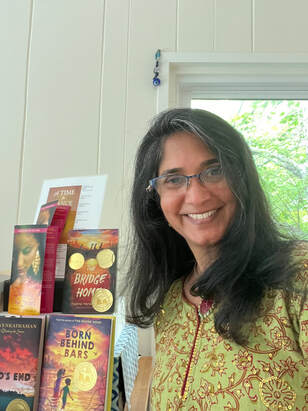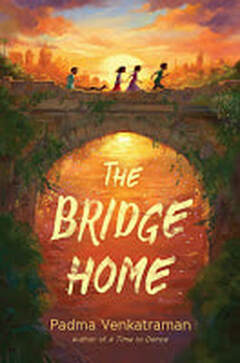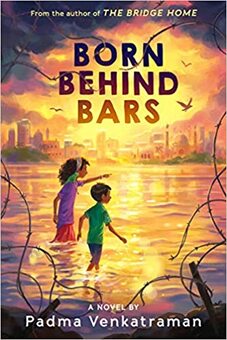| Padma Venkatraman is the author of Born Behind Bars (which has met with challenges in the current climate), The Bridge Home, A Time to Dance, Climbing the Stairs and Island’s End, which have secured over 20 starred reviews and sold over ¼ million copies. She is the winner of a Walter Dean Myers Award for Outstanding Children’s Literature, Golden Kite, Crystal Kite, three South Asia Book Awards, two Paterson Prizes, Julia Ward Howe and Nerdy Book Awards; recipient of Malka Penn, Sakura Medal, Prix des Libraries, Storytelling World and Litterado honors , etc. Her work has frequently appeared on numerous best book lists (ALA Notable, Kirkus, Booklist Editor’s Choice, NYPL, Chicago Public Library, Bank Street, CSMCL and many more). Dr. Venkatraman loves leading writing workshops and speaking to audiences of all ages about reading and diversity; has been featured author at international festivals; and the keynote speaker at NCTE/ALAN, SLJ Day of Dialog and other prestigious venues. Born in India, she immigrated alone at age 19, directed a school in England, served as chief scientist on a German oceanographic vessel, conducted research in environmental engineering at Johns Hopkins and the College of William and Mary, and led diversity efforts at the University of Rhode Island, before becoming an American citizen. |
Instead, I was shocked to find that questions were being raised about the information on the slides I’d sent ahead to the school to download (as I always do). This is my usual procedure, whether I’m presenting a keynote to a ballroom full of adults or a workshop to a select few students in a classroom. I like to ensure that the host has a chance to upload my presentation to a laptop on site ahead of my visit, well in time to ensure that everything looks compatible. That way, we’re ready to go, without any wasted time (but if something goes unexpectedly and inexplicably awry with technology, I can always pop in one of the billion back-ups that I bring with me on flashdrives). It was amply clear that I was sending my presentation to the school ahead of time so they could ensure the slides were in readiness for my use – I had not sent them to be reviewed. Never before, in the many schools visits I’ve done for over 15 years (since the release of my debut novel), have I experienced a similar violation and breach of honor and trust. Ironically, this occurred during banned book week.
Concern was expressed that the students would not be prepared to hear about some “heavy topics” addressed briefly in my presentation. One of the issues was domestic violence; although my novel, THE BRIDGE HOME, which I’d specifically been asked to speak about, opens with an off-screen incident of physical abuse. In the numerous talks I’ve given all over the world since the novel was published, I mention that I have survived a difficult childhood, and so this scene in the novel was particularly hard to write. I never get into any detail of the actual trauma I endured, not even with a group of adults, let alone a classroom full of children! But I insist on making this simple statement because speaking my truth aloud has enabled many children (and even some adults) who were experiencing terrible situations of their own, to ask for help from a professional they trust in their own communities. My book and my talks have acted as catalysts to help other human beings take potentially life-saving steps to protect themselves from further harm and move to safety. This is the most rewarding gift my work has given me – the knowledge that my words have the power to change lives for the better.
Another topic that worried the school was child enslavement, although this theme is also central to THE BRIDGE HOME. Forced child labor is an implicit threat that hangs over the main characters in my novel, which portrays the horrific reality that so many homeless children face in India, where the novel is set. And, whenever I speak to groups in our nation, I feel it is vital that my readers also realize that hunger, poverty and child labor exist not only half-way across the world, but also in these United States. If a discussion ensues during the question and answer session after my talk, I refer to the example in THE BRIDGE HOME, in which Muthu speaks briefly about being forced to work for the owner of a sweatshop. After reading THE BRIDGE HOME, children all over the world have helped combat hunger and poverty in their own backyards by taking the initiative to discover how best to assist those children who are their neighbors but who lack socioeconomic privilege. Other groups of young people have reached out to collect money or provide other kinds of assistance for children in remote parts of the world. Each time I hear about such an effort, it moves me, and I am humbled that I have helped inspire child-led empathetic action.
A look at my biography should reveal that I once taught children in middle and elementary school. A quick perusal of my work should show that as an author, I prefer to center a character’s survival rather than getting into excruciating detail about any cruelty they may have suffered. My talks and my books allow my readers to see the inhumanity that exists in our world in an age-relevant manner, so that they may strive to create a better future. I am sensitive to the kind of reader I once was – a child who had nightmares for weeks if she ever came across graphic descriptions of violence. My goal is not to frighten but to inform, gently but accurately, so that readers’ hearts are touched, their minds strengthened, and their spirits ultimately uplifted.
In the numerous author events I have conducted with similarly aged children all over the world, I have always been humbled by the deep, lasting and meaningful connections my work has generated. My goal as an author is to increase respect, acceptance and compassion amongst us. When someone opens a book I’ve written, I hope they are opening a door, not just to a different time or place, but into the minds and hearts of my characters. I don’t write to entice readers to escape (although I respect authors whose aim is entertainment). I write to invite readers to engage by exercising their empathy – and thus empower themselves.
I love speaking with audiences of all ages – but there is always something extra-special about connecting with young readers. Much as I wanted to visit the children at the school that raised such unexpected concerns, I could not, in good conscience, change my program and omit discussing three vital themes in the books I was invited to speak about. The school chose to cancel my visit at the last minute, adding yet another incident that needs to be counted and added to the files documenting censorship. And I chose to write about it because recording these hateful acts is vital in our fight to preserve every child's democratic right to access to books that I consider to be packages of compassion.
In BORN BEHIND BARS, one of the characters says “Fear is a Lock. Courage is a key.” The desire to censor my carefully and caringly prepared presentations was, I believe, born of fear, as is every challenge my books have met. The recent spate of book banning has resulted in my receiving fewer invitations to speak than when I was a debut author. Inordinate numbers of the books being banned in our nation today have been written by authors of color or authors who are part of the LGBTQ2+ community. Banning our voices is an attempt to erase our existence; a hateful exclusionary act rooted in fear. But my colleagues and I hold the keys of courage, and we will continue to create books that unlock mutual understanding in our society and our world.




 RSS Feed
RSS Feed